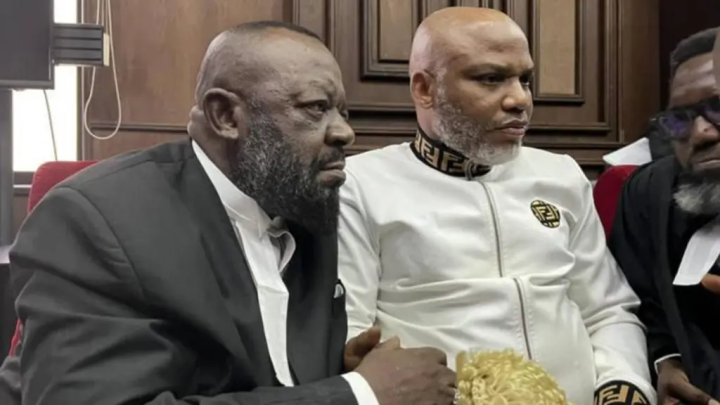The detained leader of the Indigenous People of Biafra (IPOB), Nnamdi Kanu, on Wednesday alleged that an operative of the Department of State Services (DSS) threatened him into making confessional statements following his 2015 arrest.
Kanu made the revelation after the Federal Government’s third prosecution witness, identified only as CCC, took the stand before Justice James Omotosho of the Federal High Court in Abuja.
The witness, like the previous two—coded AAA and BBB—claimed to be part of the DSS team that investigated Kanu in 2015. He told the court that Kanu was interviewed on October 21, 22, 23, and 24, and again on November 4 of that year.

The sessions, he said, were recorded, and Kanu made written statements after each.
Lead counsel for the prosecution, Adegboyega Awomolo (SAN), tendered two video compact discs and three copies of the alleged written statements as evidence.
Although the defence team initially raised no objection, one of Kanu’s lawyers, Paul Erokoro (SAN), later objected, informing the court that his client had just disclosed that the statements were made under duress.
Erokoro alleged that the DSS denied Kanu access to legal counsel, withheld medical privileges such as a daily hour of fresh air, and threatened to obstruct his chances of being granted bail.
In response, Justice Omotosho ordered a trial-within-a-trial to determine the voluntariness of the statements.
During the proceeding, the DSS witness insisted the statements were made freely. However, under cross-examination, Erokoro queried the witness about the detention process, the identity of all DSS officers at the time, and whether he had access to Kanu’s cell. The witness said he never entered the cell but knew the gatekeepers responsible for detainee interactions.
Erokoro asked, “If a DSS officer named Mr. Brown visited the defendant in his cell to threaten him, you wouldn’t know, would you?”
The witness responded, “The DSS does not operate like that.”
Testifying during the trial-within-a-trial, Kanu said the alleged coercion began in Lagos where his hands and legs were shackled, he was blindfolded, and flown to Abuja without knowledge of his destination.
He stated that upon arrival, he was placed in solitary confinement with no light and later threatened by a certain Mr. Brown—allegedly the DSS assistant director of investigations—who warned him to comply or risk being denied access to medical advice and fresh air.
Kanu also claimed that due to poor detention conditions, he suffered nosebleeds, and was subsequently allowed a one-hour daily outdoor break on medical advice. He alleged that the DSS threatened to withdraw the break if he failed to comply during interrogations.
He further insisted that the video evidence presented in court had been edited and that he was compelled to write the statements.
Following Kanu’s testimony, the trial-within-a-trial was closed. Justice Omotosho directed both parties to adopt and file their written addresses by 9 a.m. on Wednesday, May 29.
Support InfoStride News' Credible Journalism: Only credible journalism can guarantee a fair, accountable and transparent society, including democracy and government. It involves a lot of efforts and money. We need your support. Click here to Donate
